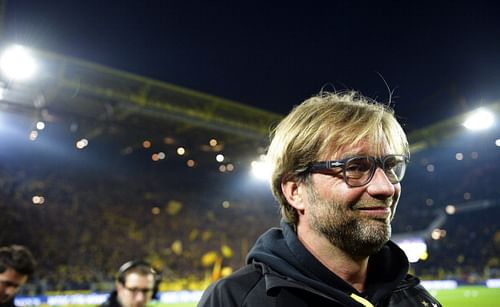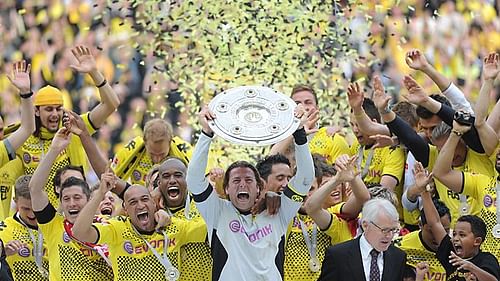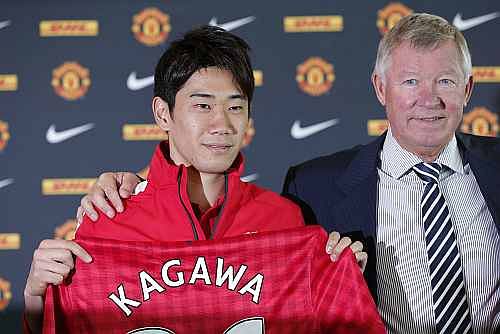
The rise and fall of Borussia Dortmund

The man who believes in Heavy Metal football. Jurgen Klopp.
Borussia Dortmund. An institution that has been a revolution in recent years. A club that simply has been stunning and has notified the footballing world with their breathless and never getting tired style of play. Standing tall as a symbol of the team game boasting of home grown talent along with non-prolific signings turned stars, their system of operation is at the opposite end of the spectrum, when compared to the big money houses. Being a true representative of the underdog image, they have captured the hearts of many neutrals all over the globe.
But two successful domestic seasons followed by an all German Champions league final have finally caught up with them. They now attract attention from all the big money clubs from across the world, who certainly value the talent and the fulfilling set of future prospects Dortmund possess. With the departure of a couple of key players in a span of just over a year, Die Borussen face a crisis in maintaining their consistency and their quality. So does that mean while being on the verge of becoming a giant among Europe’s finest clubs their vision to do so ends only after a small duration?
Not long ago the club’s financial fortunes declined steadily for a number of years and they were driven to the brink of bankruptcy in 2005. The Westfalenstadion had to be renamed the Signal Iduna Park in 2006 to reduce the burden of debts. Hans Joachim Watzke , a German entrepreneur entered the scene and together with club president Reinhard Raubell and CFO Thomas Tress, he saved the Westphalian club by restructuring their debts before they hit bankruptcy.
Watzke was able to reduce the backlog in the following years. But on the pitch a miserable start to the 2006-07 season saw Dortmund face an unexpected relegation battle. The club officials went through three different coaches before finally appointing Thomas Doll in 2007. The solution wasn’t still knocking on the door as Dortmund lost to many smaller clubs in the league next season combined with a loss in the finals of the DFB Pokal against domestic rivals Bayern Munich.
The tide turned when Jurgen Klopp was appointed in May 2008. Having been a player himself, the man injected renewed passion in the squad which proved fruitful in the first season itself as Dortmund came out victorious in the DFB Super Cup final against Bayern Munich. Further success followed in the 2009-10 season as they sealed a Uefa Europa league spot with a fifth place finish in the Bundesliga.
The self-proclaimed fan of heavy metal music was quite hardcore in his approach towards the game.Fielding a young set of exuberant and vibrant players entering the 2010-11 season, Klopp spearheaded his boys into contention for the league. With a convincing seven point lead over 2nd place Bayer Leverkusen, Borussia Dortmund won the Bundesliga which automatically earned them a Champions league group stage spot for the next season.

Dortmund as Bundesliga Champions for the 2nd consecutive time in 2011-2012.
The 2011-12 season was rounded off in style as they clinched their consecutive title with a record breaking tally of 81 points. They also did the double for the first time ever by beating rivals Bayern Munich 5-2 in the finals of the DFB Pokal. Voted as the team of the year, the team consisted of upcoming talents like Mario Gotze, Ilkay Gundogan, Shinji Kagawa, and Robert Lewandowski.
With two successful domestic seasons and yet another Champions league appearance, they were the surprise package of the season in Europe. Offers started to flow in as European giants started moving for Dortmund players in the transfer market. The first punch came in when Dortmund’s highly rated attacking play-maker Kagawa was offloaded to Manchester United. His departure was a blow to them, but that didn’t alter their confidence.

Shinji Kagawa signs for Manchester United